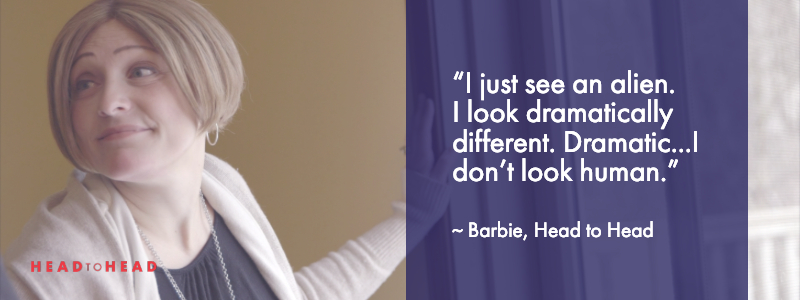Keeping secrets is an inescapable part of being human. The average person is keeping 13 secrets right now. Five of them are secrets they’ve never told anyone. Exposing something could make us vulnerable to judgment and scrutiny. However, the cost of hiding a secret is less obvious and more insidious.
“Sometimes the worst thing is that no one suspects. It’s like no one knows you at all, not truly.”
– Holly Brown, LMFT, author of “The Cost of Keeping Secrets”
Through the process of filming our documentary, Head to Head, my sister and I have interviewed over 20 women who literally come face-to-face with their biggest secret everyday and must choose to either fit in or stand out. These women have lost their hair for medical reasons, either from cancer treatment or autoimmune conditions, like Alopecia or Lupus. The women we interviewed explain how the most devastating part of losing their hair is the rift that forms in her self-identity.
Barbie, stay-at-home-mom in rural Indiana and Alopecian, describes this feeling when she sees her reflection in the mirror without hair, “I just see an alien. I look dramatically different. Dramatic…I don’t look human.”
A wig can help a woman feel normal, but it also makes her feel like she’s interacting with the world from behind a curtain. In Ebony’s case, it’s like she’s trying to hide the “big elephant in the room.”
For some, this persistent worry starts to make them frustrated, defensive, angry and tired. It’s a vicious cycle, too. Disengagement from vital relationships and social life oftentimes leads to depression and/or other mental health issues, which impacts their physical ability to bounce back from the medical issues that are causing the hair loss.
These stories reach far beyond hair and teach us how important it is to feel comfortable presenting your true self, which is only possible if our environment fosters inclusion, compassion and understanding.
In a business context, inclusion is starting to become a bigger priority in work culture. Deloitte, a leader in diversity initiatives, argues why it should be. Deloitte conducted a major study, titled “Uncovering Talent: A new model of inclusion,” which finds this perception of needing to cover up a piece of your identity to fit into workplace “norms” is extremely pervasive for everyone and, in fact, impacts productivity and satisfaction at work. The energy required to behave in conforming ways is energy taken away from getting work done. Deloitte challenges all businesses to encourage authenticity at work, starting at the top. Fostering culture of inclusion is not only the right thing, it’s good business.
Our film qualitatively supports Deloitte’s findings through a physical cover up. Hair has an uncanny way of allowing people to reflect on their own hangups and ways they can champion authenticity at home and at work. You can start by asking yourself:
- How/Why do I create “versions” of myself to fit in?
- How does my environment, filled with social media blitzes, rapid-fire interactions, and insta-judgments, shape different iterations of myself tailored for different situations?
- What would happen if I put it all out there and presented my true, authentic self?
If you’re interested in continuing this conversation, join us on Instagram @headtoheaddoc
Please contact Katy Osborn for more information. katy@ameliastreetstudio.com
Content provided by Women Belong member Katy Osborn











































 Introductions - Members Only
Introductions - Members Only Unleash Your Marketing Swagger: Crafting an Authentic Strategy for Customer Engagement
Unleash Your Marketing Swagger: Crafting an Authentic Strategy for Customer Engagement Women Belong Book Club
Women Belong Book Club Women Belong Book Club
Women Belong Book Club Harnessing AI to Boost Your Social Selling
Harnessing AI to Boost Your Social Selling